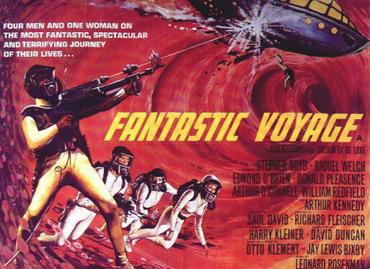A Soviet scientist, Doctor Jan Benes has developed revolutionary technology that can shrink people to microscopic size, and during his escape to America narrowly evades an assassination attempt. But he’s in critical condition and it’s determined that a crew of scientists will be shrunk by his device, sent inside his body, and repair the damage safely from there.
The premise is of course ridiculous, but the film works with it, trying its best to portray it accurately and with a sense of real drama and stakes. To it’s credit, this comes across and some decent performances and writing keep the story from getting stale. Truth is no matter how ludicrous the premise, the idea is one though that can’t help but trigger your curiosity. What would the inside of a human body look like up close, what would it be like to interact with it? It’s such an interesting and very Verne-esuqe idea that it’s been repeated in pop culture countless times since in everything from The Magic School Bus to Futurama (“Parasites Lost”, one of their best episodes). Director Richard Fleischer who had experience with a similarly fantastic adventure in Disney’s 20,000 Leagues Under the Sea, does well to direct the circumstances and suspense. The characters undertaking the mission have a race against time, as the effects of the shrinking will revert after an hour. Though I am disappointed we don’t get to see them restored to human size while still in the body resulting in a gruesome yet humourous effect The Simpsons characterized pretty well, it does relay a genuine feeling of pressure on the protagonists.
The elephant in the room when it comes to this movie though, and virtually every other science fiction film from this period, is the effects. By today’s standards they are pretty poor. If you’ve seen any microscopic images of what the inside of the body looks like, blood cells, and organs like the lungs and heart, you know the depictions here are inaccurate. That’s not to say they didn’t try their best with what they had, but it is hard to believe these characters are actually traversing the human body in a number of moments. Had this film been made a few decades later it would probably have looked a lot better. It’s one of those cases where James Cameron’s philosophy about waiting for technology to catch up to one’s ambition and imagination would have paid off. That being said a number of cheesy effects both in the body but also with regards to the ship and lab designs are actually enjoyable in how dated they are. It’s almost Forbidden Planet or original series Star Trek in how goofy it looks with levers and shiny buttons and such, which is funny considering it’s supposed to be set in a fairly modern era to when it was made.
One of the really less engaging aspects of this movie are the characters. Don’t get me wrong, the cast is great. Stephen Boyd from Ben-Hur plays a secret agent leading the mission that’s also complimented with William Redfield as the pilot, Arthur Kennedy as an expert surgeon, and two stock characters: the intelligent but clearly evil doctor played stupendously by Blofeld himself, Donald Pleasence, and the eye candy which for the late 1960’s meant Raquel Welch, supposedly the assistant to Kennedy’s character. And Edmond O’Brien guides them from the outside, following them using a funny map of the body on the wall. Unfortunately none of the characters have much personality to them apart from being witnesses to the situation. Decent performances though they are, Boyd and Redfield are fairly boring and Welch you can’t take seriously (especially when she’s forced into a jumpsuit that might be a little too tight). I liked Kennedy though, he usually can bring a bit of weight through his physical performance (he always looks like he’s suspicious of something), as can O’Brien. And Pleasence is of course enjoyable in his very stereotypical role. But none of the characters stand on their own. Likeable, developed characters are important in grounding big idea science fiction movies like this. Like the cast of Jurassic Park. But these guys are only about as interesting as the protagonists of Westworld (the movie that is).
Fantastic Voyage is still intriguing though in spite of the effects problems and uninteresting characters. Because it does manage to convey a scope and tense situation. As the characters race to save this man’s life, evading obstacles like an arteriovenous fistula, white blood cells, keeping their voices low in the inner ear which is hilarious (again, lampooned terrifically in Futurama), and of course a “mysterious” saboteur endangering the mission for reasons that are a bit unclear, the movie actually manages to be somewhat educational. Again because of some less convincing visuals it only works slightly better than something like Osmosis Jones. However it’s still intelligent and has led to more enlightening homages. In fact this is a movie I’d like to see remade, I think it could work better in a modern context. That or read the book, which with Asimov behind it, is sure to be interesting.
Fantastic Voyage is a decently thrilling sci-fi film with a premise that’s captivating in its craziness. The effects may not age well and the characters may not be well defined, but it does open a new frontier for science fiction storytelling. We’ve seen the vastness of the universe and the depths of the ocean and the mysteries therein explored, but the human body is an endlessly fascinating network as well. Maybe the next Ant-Man movie will tackle that. I know a Fantastic Voyage kind of adventure would be a lot more fun if Michael Pena was part of it.

Comments
Post a Comment